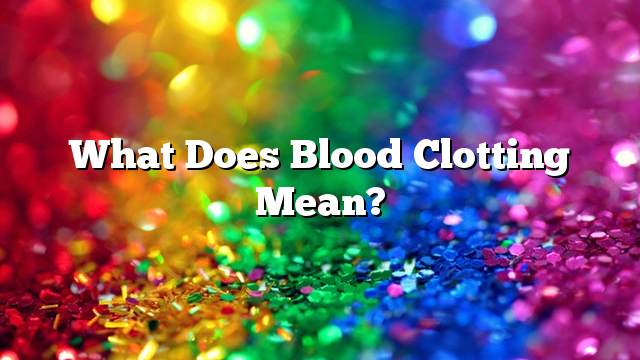Blood clotting
Blood clotting is one of the basic biological processes in the human body, occurring naturally and continuously in the blood, but it increases when there is a bleeding or when a particular disease occurs; for example, blood clotting occurs in people with cardiovascular disease too high, which causes the occurrence of sclerosis Arteriosclerosis and other health problems. Blood clotting is also affected by the presence of liver diseases, immune system diseases, hormonal diseases and sickle cell anemia. Some drugs also affect the coagulation process in the body.
The importance of blood clotting
Blood is very important in the human body, it is the essential element to deliver food and oxygen to all cells and organs of the body, so the blood in the case of continuous liquidity to facilitate the flow of arteries and veins that connect the body members. The blood is able to coagulate or clot, and the body resorts to this process to prevent the loss of a large amount of blood when exposed to a wound or injury that cause blood flow outside the blood vessels, but blood clotting may occur within the closed blood vessels also, which is described as blood clotting or blood clots; Which cause clogging of the vessels mentioned.
Causes of blood clotting
Reasons gained
- Obesity or obesity: It is one of the most important causes of blood clotting, especially for people who are obese and do not tend to move.
- Sit for long periods without movement: Such as long distance travel situations especially for the elderly.
- Subject to some surgical procedures: Such as the hip, knee, abdominal cavity, or pelvis, as well as surgical procedures that require long-term general anesthesia.
- Smoking: Smokers are more likely than others to develop blood clotting.
- Contraceptive pills: It may lead to blood clotting.
- Some diseases: They are mentioned in the introduction.
Unacceptable causes
Genetic history. Family history can increase the incidence of blood clots or clots. In this case, the majority of strokes are thrombocytopenia, not arterial clots, as are strokes that occur when you age.
Symptoms of blood clotting
- Color of the injury area is blue.
- Sore infection.
- The sensation of severe pain the place of the clot.
- Swelling of the affected area.
- Chest pain (in the case of pulmonary embolism).
- Difficulty breathing.
Complications of blood clotting
- Hypertension.
- High cholesterol.
- Diabetes or cancer.
- Smoking.
- Pregnancy, and the risk of stroke and pelvic pain; as a result of increasing the size of the uterus, which reduces the flow of blood to the heart.
